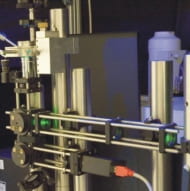PhD projects- Cohort 1: 2019
The Aerosol Science CDT welcomed fourteen students into cohort 1 in September 2019. With backgrounds from geography and earth sciences to chemistry, physics, pharmacy and biological sciences, we have a truly diverse first cohort. Building on the initial training period in Bristol, each student undertakes research on their own PhD research project, shown below.

The Coalescence of Drying Droplets
Theme: Basic processes
The initial experiment proposed here will focus on the collisions of water–water droplets of ~ 30–80 μm radius. This novel size makes the proposed work relevant to the research of aerosols and their microphysical properties. A comparison can be made with existing collisional regime maps of water to determine whether droplet size, and the shift in the kinetic regime, influencesthe collisional outcome. This will be investigated using two microdroplet dispensersto collide droplets, imaged by a stroboscopic imaging technique. Following this, the effect of viscosity on the regime map can be determined using the same method, with varying concentrations of aqueous sucrose droplets.
PhD student: Lauren McCarthy
Supervisors: Prof Jonathan Reid (Bristol) and Dr Rachael Miles (Bristol)

Determining the effects of airborne particulates on immune and barrier epithelial cell function
Theme: Aerosols and Health
Airborne pollution is a complex mixture of biological and chemical sources but their specific effects on immune function are relatively poorly understood. This exciting cross disciplinary project will define the components of pollutants and explore their impact on immune cells.
PhD student: George Adams
Supervisors: Prof. Sheena Cruickshank (Manchester) and Dr. Alberto Gambaruto (Bristol)

Investigating the charge states of ambient and indoor aerosols
Theme: Aerosol Technology
Conveying and generation of powders can lead to very high levels of charge on particles, affecting their transport agglomeration and ultimate removal from the environment. Through modelling and experiments this project seeks to optimize collection of particles in filtration processes accounting for and manipulating electrostatic charge.
PhD student: Peter Knapp
Supervisors: Dr Marc Stettler (Imperial), Dr Adam Boies (Cambridge) and Prof. Jonathan Reid (Bristol)

Building flexible biological particle detection algorithms for traditional and emerging real-time instrumentation
Theme: Measurement Techniques
Whilst the importance of biological particles in the environment, human health and as a potential security threat is known, development of robust detection technologies remains a challenge. This project will apply and evaluate a range of machine learning techniques to to convert multidimensional signatures from new and emerging detection techniques into distinct PBA types.
PhD student: Maxamilian Moss
Supervisors: Dr David Topping (Manchester) and Dr Chris Stopford (Hertfordshire)

Particle engineering approaches to control the interaction of medicinal aerosols with the lung environment following inhalation
Theme: Aerosols and Health
This article focuses on the delivery of solid drug particles by dry powder inhalers and reviews some of the particle properties that may underpin aerosol dynamics in the humidity of the respiratory system. Furthermore, in response, a novel way to produce monodisperse model particles with distinct characteristics and properties using microfluidic crystallisation techniques is presented.
PhD student: Toria Legh-Land
Supervisors: Prof Darragh Murnane (Hertfordshire) and Prof Jonathan Reid (Bristol)

Inhalable nanomedicine for treatment of pulmonary tuberculosis
Theme: Aerosols and Health
The rapid spread of multi drug-resistant tuberculosis (TB) is a major threat to global public health. According to WHO ~1.8 million people die every year of TB, with an estimated 9.8 million new infections per year, which is exacerbated due to the number of patients infected with HIV/AIDs. Treatment of TB is lengthy, with the development of drug resistant organisms due to incomplete or inappropriate treatment. We propose that many of the shortfalls of treatment of multidrug-resistant TB could be overcome by reducing the high toxicity and poor efficacy of injectable small molecule antibiotics drugs. The aim of the PhD is to develop an aerosolised, inhalable nanomedicine that delivers first line anti-tuberculous drugs.
PhD student: Khaled Alzahabi
Supervisors: Prof Terry Tetley (Imperial) and Dr Alexandra Porter (Imperial)
Development of a packed bed reactor for carbon nanotube synthesis
Theme: Aerosol Technology
This proposal will address the issue of understanding the concentration of all species at which aerogel forms. The methods to analyse the distribution of nanoparticles within the reactor both axially and radially will be performed via aerosol collection techniques. Once the fundamental reaction kinetics and concentrations of the chemically relevant species are both known and understood, the reaction will be put into a higher reaction density reactor. The data from this study will be used for modelling aerosol dynamics within the reactor and coupled with computational fluid dynamics model.
PhD student: Michael Glerum
Supervisors: Dr Adam Boies (Cambridge)

Aerosol-assisted chemical vapour deposition (AACVD) of inorganic functional materials
Theme: Aerosol Technology
This project will use aerosol assisted chemical vapour deposition (AA-CVD) to develop inorganic and hybrid semiconducting materials e.g. SnS, Sb2S3 and FeS2 by the in-situ decomposition of soluble molecular precursors. The project offers a combination of chemical synthesis and aerosol/materials characterisation.
PhD student: Ted Robson
Supervisors: Dr Andrew Johnson (Bath) and Dr Adam Boies (Cambridge)

Exploring the limits of detection for single nanoscale aerosol particles by light scattering, absorption, and luminescence
Theme: Measurement techniques
This project will employ single particle trapping techniques to specifically constrain one nanoparticle in air to avoid any interference from other particles or the environment and utilize an integrated characterization system to comprehensively explore the limits of detection by light scattering, absorption and luminescence of nanoparticles in accumulation mode. These measurements could bring about more detailed and accurate photophysical properties of luminescent nanoparticles and provide basic knowledge needed for modelling community and further novel applications.
Supervisors: Prof Jonathan Reid (Bristol) and Prof Andrew Orr-Ewing (Bristol)


Damage to jet engines by airborne particulates; Detection and mitigation
Theme: Measurement techniques
Mineral aerosols, such as volcanic ash and desert dust, present significant but uncertain risk to jet aircraft. To constrain this uncertainty the PhD researcher undertaking this project will design, build and test a jet engine simulator that will emulate engine conditions and will be field tested in a real world environment. The denouement of this project will be flying the simulator into desert storms and volcanic ash clouds on drones.
PhD student: Madeleine Reader
Supervisors: Dr Matthew Watson (Bristol) and Dr Paul Williams (Manchester)

Improving the understanding of the gas/particle partitioning behaviour of organic aerosols in different environmental conditions
Theme: Basic processes
Understanding the partitioning of molecular constituents between the gas and particle phases is central to the whole endeavour of aerosol science. This project applies ultra-sensitive techniques to investigate the volatilisation of low and semi-volatile components from aerosol particles, their response to humidity and temperature, and refining predictive tools crucial for understanding air quality.
PhD student: Tom Hilditch
Supervisors: Prof Jonathan Reid (Bristol) and Dr David Topping (Manchester)

Size, sources and transport of the seeds of ice in clouds
Theme: Environmental Aerosols
Our knowledge of the special aerosol particles which trigger ice formation in clouds is extremely poor. This project will take some of the first ever measurements of ice nucleating particle size in order to better understand their transport.
PhD student: Kathleen Thompson
Supervisors: Prof Ben Murray (Leeds) and Prof Catherine Noakes (Leeds)

Extinction Cross Section Measurements for Single Aerosol Particles Confined to a Linear Electrodynamic Quadrupole Trap
Theme: Environmental Aerosols
The contribution of organic aerosol to the warming of the Earth’s atmosphere remains uncertain because particle composition and morphology affect the absorption of sunlight. Using a recently developed spectroscopic apparatus, this project will measure precise optical properties of single, trapped aerosol particles.
PhD student: Jamie Knight
Supervisors: Prof Andrew Orr-Ewing (Bristol) and Dr Adam Squires (Bath)

Dynamic Surface Properties of Atmospheric Aerosol and Resulting Climate Impacts
Theme: Basic processes
The surface tension of atmospheric aerosols impacts their ability to serve as cloud droplet seeds and affect climate. This project will develop approaches to measure droplet surface tensions and better resolve dynamics at the particle surface, working closely with modellers.
PhD student: Josh Harrison
Supervisors: Dr Bryan Bzdek (Bristol) and Dr Matthew Watson (Bristol)

EPSRC CDT in Aerosol Science
University of Bristol
School of Chemistry
Cantock's Close
Bristol, BS8 1TS
aerosol-science@bristol.ac.uk
Partner Newsletter
Sign up to receive monthly news and updates from the CDT in Aerosol Science, as well as events, training and research webinars.
